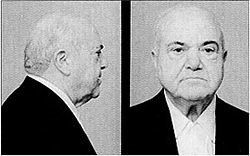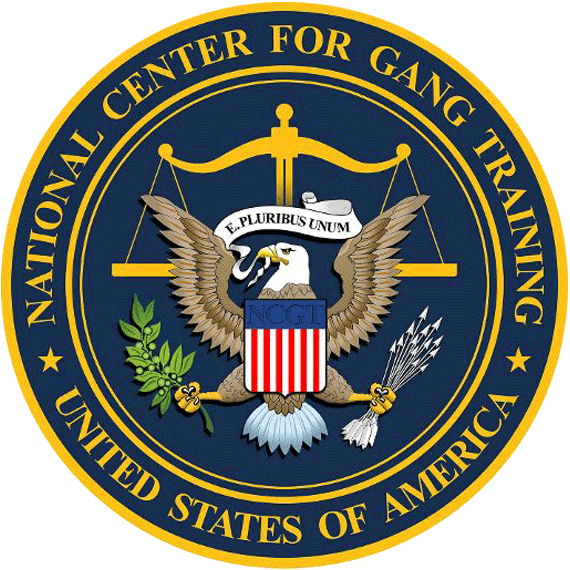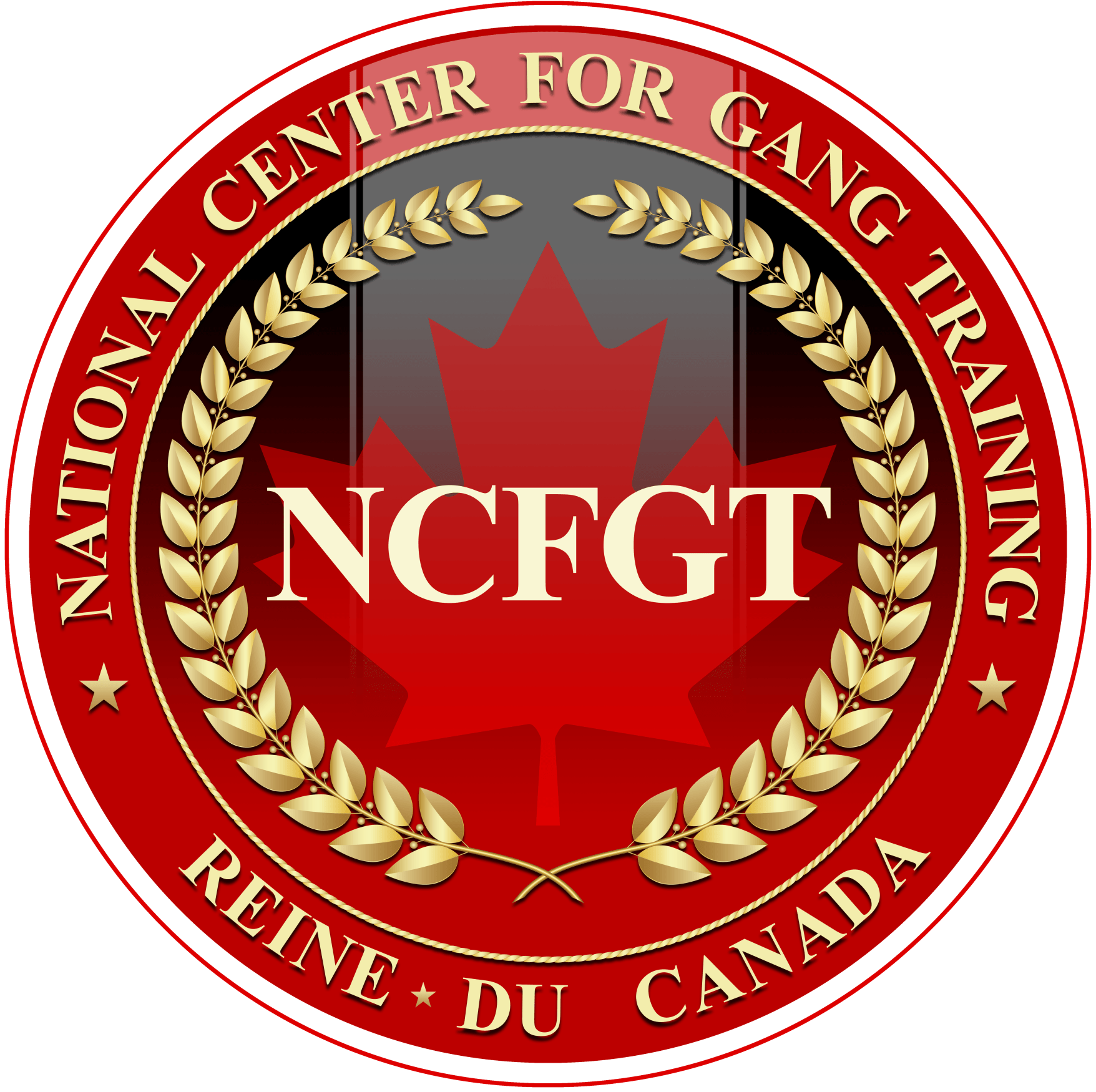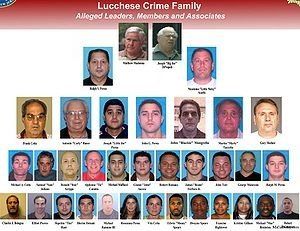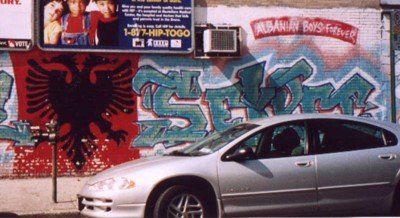The Jersey crew
The Jersey crew
The Jersey Crew is a powerful faction of the Lucchese crime family, that operates and controls illegal activities like drug trafficking, labor racketeering, loansharking, extortion, illegal gambling, money laundering, and murder, in the Northern New Jersey area.
Early history
Toward the 1940s and early 1950s, the New Jersey Crew expanded their operations through their legitimate businesses. The crew had since 1931 been under the control of Gaetano "Tommy" Lucchese, the Underboss of the Gagliano crime family, and the crew kept operating from Bergen County through Essex, Morris, Passaic and Union counties, all the way to Sussex County. Upon the death of longtime Boss Thomas Gagliano, Tommy Lucchese was soon installed as boss of the family, which was renamed the Lucchese crime family. The crew were then headed by several of their high-ranking members, like prominent New Jersey mobsters Settimo Accardi, Anthony "Ham" Delasco, and Joseph Abate from Newark. As the time of the Joseph Abate regime as leader was ending, Anthony "Tumac" Accetturo, who was chosen to become the new leader to the crew, Accetturo had a good friendship with Lucchese caporegime Anthony "Tony Ducks" Corallo and was put in charge of the crews entire illegal gambling and loansharking operation in Newark. The crew had a new unofficial leader.
Chart of the 2007 "Operation Heat" capos Joseph DiNapoli, Matthew Madonna, Ralph V. Perna and Nicodemo Scarfo, Jr.
On December 18, 2007, New Jersey law enforcement indicted and arrested 32 members and associates of the Lucchese crime family. In a year-long investigation titled "Operation Heat" law enforcement agencies uncovered a $2.2 billion dollar illegal gambling, money laundering and racketeering ring from New Jersey to Costa Rica. Two members of the Lucchese family three man ruling panel were indicted Joseph DiNapoli and Matthew Madonna, top New Jersey Faction capos Ralph V. Perna and Nicodemo Scarfo, Jr.. Others indicted included members Alphonse Cataldo, Martin "Marty" Taccetta (brother of Michael Taccetta), and associates Frank Cetta, Antonio Russo, Joseph M. Perna and John G. Perna, Ralph M.
Perna (all three are sons of Ralph Perna), John Mangrella, Gary Medure, Samuel Juliano, Michael Maffucci, Gianni Iacovo, Robert Romano, James Furfaro Jr., John Turi, George Maiorano, Michael A. Cetta, Charles J. Bologna, Elliot Porco, Shptim Hani, Blerim Ibriami, Michael Ramuno III and two female associates Roseanne Perna (wife of Joseph Perna) and Vita Cetta.
The investigation also uncovered that Lucchese family members had aligned with members of a Bloods street gang set "Nine Trey Gangsters" to smuggle heroin, cocaine, marijuana and cell phones into East Jersey State Prison with corrupt prison guards. The prison corruption involved Lucchese associates Joseph Perna and Michael Cetta with gang members Edwin Spears, Dwayne Spears, Francine Higtower, Kristine Gilliam, and Michael Bruinton.
Current position
Although the Jersey Crew is much weakened due to increased law enforcement and internal rivalry, Michael Taccetta, at age 60, is reported as the official boss of the New Jersey faction of the Lucchese crime family, though he is serving a prison term without the possibility of parole. Upon his release, Martin Taccetta is reportedly ready to take over as the Boss of North Jersey. The crew is estimated to have between 20 to 30 made members, and twice as many associates. Still, after prosecution, the Jersey Crew remains a strong faction of the Lucchese crime family, operating with illegal activities mostly in Newark.
Historical leadership of the Lucchese's New Jersey faction
A leading capo in the faction is chosen as boss to supervise the other capos. However, this rank of boss carries little power in New York as the family leadership still views him as just a capo.
- 1920s–1930 – Gaetano "Tom" Reina (controlled the New Jersey Faction from his Bronx base; involved in transporting bootleg alcohol and whiskey into NYC; murdered on February 26, 1930 during the Castellammarese War by the Masseria faction.)
- 1930–1953 – Gaetano "Tommy" Lucchese (Underboss he over saw the faction actives and operations he received profits from the faction; Lucchese was promoted to Boss of the family in 1953 and moved to Long Island)
- 1940s–1955 – Settimo "Big Sam" Accardi (became the leading member of the New Jersey faction operating from his Newark Crew; promoted to Boss/Capo of the entire New Jersey faction after Lucchese became the Boss in 1953; Accardi worked with rival Elizabeth, NJ family boss Sefano Badami; in 1953 his citizenship was revoked; arrested on narcotics charges in 1955 and fled the country)
- 1955–1960s – Anthony "Ham" Delasco (became the Boss/Capo of the Jersey Faction; Anthony Accetturo became his driver and protégé shaking down bookies and loan-sharks for Delasco; he died sometime in 1960s)
- 1960s-1979 - Joseph Abate (became the Boss/Capo of the Jersey Faction; took over the Newark crew after the death of Delasco; semi-retired in 1979 leaving Accetturo in charge of the Crew; died naturally in 1994, age 92)
- 1970s-1988 - Anthony "Tumac" Accetturo (allegedly in charge of a crew in his early 20s, while working with Anthony Delasco as his driver and protégé; continued to work for the Jersey faction under Joseph Abate he was finally inducted by 1976; took over as Acting Boss in 1979; relocated to Florida during the late 1970s early 1980s and set up rackets; acquitted in the 21-month trial along with other Jersey faction members on August 26, 1988; in 1987 was stripped of Capo his rank demoted to a soldier; tension between Accetturo and Taccetta almost started a war; was threatened to be murdered in 1993 Accetturo defected and became an informant)
- Acting 1980s-1988 - Michael "Mad Dog" Taccetta (Michael had his own hierarchy with Michael Perna as underboss and his brother Martin Taccetta as Consigliere they controlled the entire Jersey Crew of the Lucchese family)
- 1988–present – Michael "Mad Dog" Taccetta (served as the acting leader for Accetturo; acquitted in the 21-month trial along with other Jersey faction members on August 26, 1988 and became the official leader of the Jersey faction late 1988; almost started a war with Accetturo; Michael set up some rackets in Philadelphia in the early 1990s; in 1993 was convicted to life in prison along with his brother Martin and Michael Perna with help from testimony of Thomas Ricciardi and Anthony Accetturo; Michael stayed the official leader of Jersey Faction).
- Acting 2005-2007 – Martin "Marty" Taccetta (released from prison in 2005 due to lack of evidence in his 1993 trial; took over again with help from Ralph Perna; On July 30, 2009 the New Jersey Supreme Court reversed lower court decision that granted him his release and reinstated his life sentence for racketeering and extortion)
- Acting 2007–present - Ralph Vito Perna (the 63 year was released from prison in 2006; is serving as Acting Boss/Capo on behalf of Michael Taccetta)
Current faction leaders
The Lucchese family's New Jersey faction operates in Newark's Down Neck section and Northern Jersey counties of Essex, Union, Morris, Monmouth, Bergen, Passaic and Sussex.[1][2] In the faction also has rackets in Florida, South Jersey and Philadelphia.
- Boss/Capo Michael "Mad Dog" Taccetta - Capo of the Jersey crew and boss of the entire New Jersey faction of the Lucchese family. Longtime rival of Victor Amuso. Currently serving life in prison for conspiracy charges and drug trafficking. His younger brother Martin Taccetta was reportedly the acting boss of the Jersey Crew until he was sent back to prison.
- Acting Boss/Capo Ralph Vito Perna - longtime Jersey faction member, released from prison in 2006 and took over as acting faction leader in 2007. Perna was arrested in December 2007 with Joseph DiNapoli, Matthew Madonna two members of the family's ruling committee. The Jersey crew was involved with running a gambling operation that earned approximately $2.2 billion in a 15-month period. The crew also worked with New Jersey correction officers and members of the Nine Trey Gangster, a set in the Bloods gang. The crew would use gang members to smuggle drugs and pre-paid cell phones into New Jersey state prisons.
Capos
- Robert "Bucky the Boss" Caravaggio - Capo in the Jersey Crew who oversees operations in the northern New Jersey, especially Morris County. Caravaggio also worked with Carlo Taccetta.
- Joseph "Joey" Giampa - Capo in the Jersey Crew. Giampa has a stepson named Gennaro Vittorio, a.k.a. Gerry Giampa who is also involved in organized crime.
- Nicodemo Scarfo, Jr. - Capo operating in the South Jersey-Philadelphia area, he is the son of former Philadelphia family boss Nicodemo Scarfo. He was a soldier in the Scarfo family, until his father’s arrest in the mid-1990s, he then joined the Lucchese family with his father’s help. There are rumors that Scarfo is trying to take over the Philadelphia family.
Soldiers
- Alfonso T. "Tic" Cataldo - a soldier in the Lucchese family running illegal gambling operations in northern New Jersey. He is working with Eurasian organized crime groups. Cataldo was arrested in December 2007 on charges of promoting gambling, money laundering and racketeering charges along with two members of the Lucchese ruling panel Joseph DiNapoli and Matthew Madonna.
- (In prison) Michael J. Perna - soldier and former Capo in the Jersey faction; he began working for the Lucchese families Jersey faction sometime in 1976; by the 1980s was serving as the Underboss of the Jersey Faction for Michael Taccetta; acquitted in the 21 month trail along with other Jersey faction members on August 26, 1988; in 1993 was convicted of gambling and extortion along with Michael and Martin Taccetta with the testimony of Thomas Ricciardi and Anthony Accetturo; relatives include his father Joseph Perna, younger brother Ralph; The 67 year-old is currently imprisoned at the Federal Correction Institution at Fairton, New Jersey his projected release date is August 2, 2015.
- (In prison) Martin Taccetta - soldier and former Capo in the Jersey Crew was released from prison in 2005 due to lack of evidence in his trial, and wrongfully being accused of murder charges in his older brother Michael Taccetta's trial in 1993. On July 30, 2009 the New Jersey Supreme Court reversed lower court decision that granted Taccetta release and reinstated Martin life sentence for racketeering and extortion.
Sub-groups
The Jersey Faction has several sub-groups
- In Miami and Hollywood Florida started by Anthony Accetturo in the late 1970s.
- In Philadelphia started by Michael Taccetta in the 1980s.
Former Jersey crew members
- Giacomo "Jackie" DiNorscio (former Philadelphia crime family member changed to join Lucchese crime family in 1980's)
- Thomas "Tommy Boy" Ricciardi (soldier; 1993 turned FBI informant)
- Vincent "Jimmy" Craparotta (Lucchese family associate; killed 1993)
Popular culture
- The 2006 Sidney Lumet film Find Me Guilty chronicles the 2-year trial of Accetturo, the Taccetta brothers and the other family members. Vin Diesel stars as Giacomo "Jackie" DiNorscio who defends himself.
- According to the Crime Library website, the Jersey Crew is the main inspiration of the DiMeo crime family in the HBO TV-show The Sopranos. Michael Taccetta is probably the inspiration to the leading role of Tony Soprano, as other real-life Jersey crew members can be recognized on the screen.
